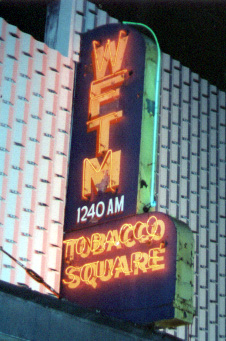
WFTM
"Ladies and gentlemen, our national anthem."
Since 1948, these
words have greeted early risers in Maysville, Kentucky and the
surrounding
Ohio River Valley. Since going on the air, WFTM has provided listeners
in
both Ohio and Kentucky a capsulized reflection of their lives, covering the
people,
places and things that make the area unique. And while the times have
changed, some
things have stayed the same, including WFTM's dedication to
bringing entertainment and
information to their listeners.
"TO HAVE BROADCASTING STATION HERE
FINCH & CLARKE TO OPERATE IT: WILL
BE WKYO"
The headline from the September 10, 1947 edition of the
Maysville Public Ledger introduced the Mid-Ohio Valley to what would soon be
their radio voice. James M. Finch Jr. and Charles P. Clarke were to be the
owners of the new station. Clarke says his first reaction to Finch's suggestion
of a radio station was, "Oh, no, Mitch. I don't want to start any radio station!
I said, we don't know anything about it. But we started it. It's certainly been
a great experience."
Finch and Clarke did not get their radio station on the first try. Finch
explains: "We decided we wanted a radio station in Maysville. We started to
apply. Had the permit all typed out, the price on the equipment. I was gonna
take it to Washington. And about that time World War II came along. Of course,
everything was cancelled. And about two months later I was in the army. So that
took care of that. "As soon as I got home we applied again to Washington. And we
had two lawyers working on it for us, and the Vice President of the United
States, Alben Barkley, Senator Barkley. And, if it hadn't been for him I don't
think we would've gotten out permit approved.
"I'd go to Washington about every 2 weeks and we'd get turned down about
every two weeks. He {Barkley} took it on himself to get Maysville approved for a
radio station. And he made a promise, 'Now, you'll have it the first of the
week.' Well, the first of the week they passed us up again. So I went back to
Washington. He said, "What?! They didn't do it? After they promised? You wait
right here.'He got a taxi and went down to the F-C-C, came back in about a half
an hour and said, 'You'll have it Friday. And that's all there was to t. We had
it Friday."
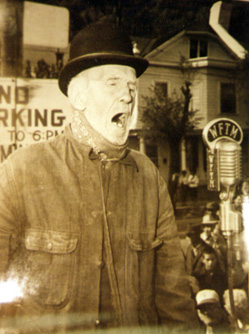
Things were in place for WKYO to go on the air. But, how did WKYO become
WFTM? According to Finch, "WKYO was assigned to us by the F-C-C. And WFTM was
assigned to the police station in Buffalo, New York. "Well, I called up the
Chief of Police and told him who we were, and about what a big tobacco market we
had, and we'd love to have WFTM, which would stand for "World's Finest Tobacco
Market." "Well,' he said, 'I have no love for these WFTM letters they gave us.
I'll ask the F-C-C to release them if you do something for me.' I said, 'What?
I'll try.' He said, 'Send me a Kentucky ham and a chew of burley tobacco, and
I'll ask them to let you have WFTM, and I'll take the ones they assigned you.
Just trade them.' It took about two weeks of horse-trading, but we got the job
done. And that's the way we got it."
Finch and Clarke selected experienced radio men to get their station off the
ground. Serving as manager was J.W. Betts, a veteran radio man with experience
from stations in Kentucky, Ohio, Alabama, and Illinois. Finch says, "Betts was a
good man for the Maysville community. He was a good man for Kentucky. He was
certainly a good man for this radio station."
Clarke agreed. "I don't think anybody realizes how lucky Mitch Finch
and myself have been with the help we've had around us. And I'd say Bill is one
of the top men we've had."
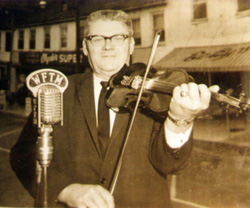
Gene Waters was hired as program director. Waters, an award-winning
promotions man, came to WFTM from WSAU in Bloomington, Indiana. According to
Clarke, "The fellow I felt like helped make our radio station go was nobody but
Gene Waters. He was just a curiosity in himself." The chief
announcer slot went to Hal Sagraves, also from WSAU. Sagraves started his radio
career in Portsmouth, Ohio at WPAY. Also on the air was Lou Franz, a former member
of the University of Kentucky radio station in Lexington, Kentucky. Dorothy "Dot"
Wood served as woman's program director, and would go on to be known by many as the
"Twilight Lady."Maysville legend Coach Earle D. Jones reported on the sports.
The cornerstone of the station's contribution to local farming was a one-hour
show each afternoon, hosted by Dover farmer J. Scott True. The title of the
show, thought up by Program Director Gene Waters, was "True to the Farm." The
program featured special guests each day to discuss items of interest to local
farmers. According to Clarke, True was one of a kind: "There'll never be another
one like him. He could tell those stories about him being out in the outhouse
reading the paper every day, and next week he'd tell the same story and it would
sound just as good. There's nobody like him. 'Course, I have to say, Gene Waters
made Scott. He worked with him for days and days. The first day that we went on,
Scott went on, fixed himself up just like he was on television. He polished his
shoes, he fixed his tie, he combed his hair."
Chief engineer for WFTM was Louisville native William Martin. Martin brought
his experience from Army communications and WKLX in Lexington to the new station.
State-of-the-art equipment powered the new station. WFTM's power output was equal
to that of WLAP radio in Lexington WFTM's ground system was unique in that it was
suspended over a ravine at the end of the Standard Warehouse, where WFTM's studios
were located.
Permission to broadcast was received at 8:45 pm Wednesday night, December 31,
1947, from the F-C-C. Gene Waters describes that night:
"Toward the target date, I sat there at my typewriter, hacked away, on something
in the way of a program formula and procedure. And, coming in and out of the
place there were the two very nervous owners at the time. Charlie Clarke and
Mitch Finch were always there, quite often. "As we approached the erstwhile
target date of sometime the first week in January, we were all very uptight
about the thing. And, really, a little nervous. And sometime toward the last
week in December, Hal Sagraves entered the picture. He was the chief announcer
of the staff. Hal and I worked together out in Indiana prior to our crossing the
river. "And I remember this very, very well. On New Year's Eve things were kind
of up in the air. And we didn't really know exactly what to expect. "So, we just
kind of adandoned everything. And we hied ourselves across the river to that
splendid little town of Aberdeen. Hal always had a penchant for selecting the
best watering hole, and we ended up there in the Bloody Bucket. "We
were...enjoying life, and, all at once the call came. And, I think it really
kind of electrified us. The call came that we have been certified, and the field
examiner for the Federal Communications Commission was there, in league and in
the company with the installing engineer, the late Fred Grimwood. "Hal and I
looked at each other, and said, "Well, we'd better get back across the river.'
And, even before we could do that, Bill Clinger arrived. I don't really know
whether that station would ever have got airborne without Bill Clinger. There
was Bill, with his Dodge limousine, and we got in it, and went back across the
river, and everything was certified, and everything was beautiful. "We were all
ready to go. And, we had not prepared, understandably, for a sign-on at twelve
midnight, and formal programming as such."
As James Finch recalls, "The first second on 1948, when we pulled the switch
and started WFTM, the chief engineer got so nervous and scared, he had to go
home and go to bed." He added, "Tex Cross was the assistant. He took over, and
did a fine job." Gene Waters and Hal Sagraves kicked off WFTM's
programming by staying on the air for 24 hours straight. Sagraves said, "It was
a pretty good grind, but we had a lot of fun in doing it."
Appropriately, one of the first songs played on WFTM was Hank Thompson's "Smoke
Smoke Smoke That Cigarette." Live music was featured on WFTM's
first hours on the air. According to Finch, "Our first guest that night was
Ellen Walton. And she wanted to sing 'Ave Maria.' And she sang it! We stayed on
all night. Just had a good time."
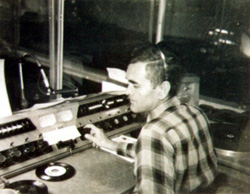
The Maysville Independent described the station's first hours: "Operation of
the new station began with the New Year of 1948 at 12:01 yesterday morning and
before the round-the-clock cycle had been completed, thousands of radio fans
were talking about the '1240 Club' and commenting upon the initial
broadcasts--at least locally--of a number of the town's best known satellites.
The outline of the day's program follows that of larger stations, with a morning
prayer service, for instance, which on yesterday was conducted by the Rev.
Robert von Thurn as guest clergyman. Last night Coach Earle D. Jones of the
Maysville Champion Bulldogs was on the air with a 15 minute broadcast. Other
features yesterday were the Children's Hour and the Maysville Matinee Club. For
the first formal broadcast several scores of persons were present to watch WFTM,
located at 1240 on the dial, make its bow and to hear the passing around of
compliments to its owners, James M. Finch Jr., and Charles P. Clarke, as well as
to J.W. Betts, station manager."
Reports of WFTM's clear signal were received from as far as Fort Worth,
Texas, Lincoln, Nebraska, Hartford, Connecticut, and Toronto, Canada." Waters said,
"I was very impressed with the number of people who were monitoring, and who all at
once got onto the fact that, at long last, here was the radio station that we have long
awaited. It was here. I think of this as the longest day. And it was. And, we kind of
muddled through. We picked up formal programming at six in the morning." True to their
word, the programmers of WFTM offered a variety of shows catering to a variety of tastes.
The station went on the air at 6 am with a look at news headlines, followed by
the sports. Programs throughout the day included "Eventide Echoes," "Harmony
Hall," "Happy Valley Jamboree," "Maysville Minute Man," "Telephone Tour," "The
Stork Comes Calling," "Make Believe Story Time," "Platters for your Pleasure,"
"R-F-D 1240," and "Piano Etching," featuring Olivette Rolph, the aunt of singer
and Maysville native Rosemary Clooney. Local sports played a large part in WFTM's programming.
The second day on the air, WFTM aired the University of Kentucky--Creighton basketball game.
WFTM's first local game was Maysville versus Vanceburg at Vanceburg January 9, 1948.
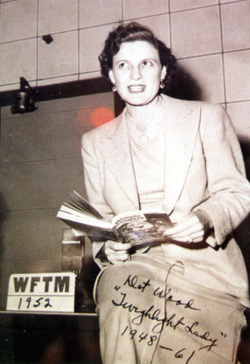
Over the years, WFTM has been a springboard for bright young talent to make
the "big time." Cincinnati broadcaster and columnist Nick Clooney. Kentucky
broadcaster Wayne Bell. New York broadcaster Joe Gillispie. And Cincinnati
broadcaster Walt mahar. Mahar talks about his years at WFTM: "I've always said
that the only way to really pursue a broadcasting career is to spend a little
time with a small radio station. If you're fortunate to latch on to the right
station, it's the equivalent of four years at any university or college
specialty school. "You know, I've been extremely fortunate in that regard. I did
find the right radio station, WFTM. I'll never forget the tape that I cut, the
first audition in 1958. It was lousy. "But Lawrence McGill, the program
director, was understanding. He hired me. He later told me that no one ever puts
together good audition tapes. Two weeks later, I was on the job. "Bud Boyd, a
man blessed with remarkable patience, was given the task of looking over my
shoulder. You know, I might have thrown in the towel if it hadn't been for Bud.
'This is the minor league,' he used to say. 'it's the only way to the majors.
Some make it, and some don't. How right Bud Boyd was. "My goal from the very
beginning was to join a metropolitan market. There were some trying moments
behind the old WFTM mic. But it must have been especially trying for the 'FTM
listeners. "What was the roughest stretch? That's easy. That half hour from 6 to
6:30 pm. Now, there's a real test for you. If the old pipes hold up after six
months of that kind of stuff, you're on your way. "There were some frustrating
moments, too. Fannie Stahl was having a grand opening for his pizza place on
Second Street. We had a remote broadcast from that spot to cover Al Lewis'
arrival. The "Uncle," from WCPO. Lewis was two hours late. I think I talked to
every kid in the west end. Some of them twice, until the Uncle arrived. "But,
that's what broadcasting is all about. And that's why the WFTM's around the
country play such a prominent part in the scheme of things. Since I've left
WFTM, I've covered major news stories in the tri-state. Followed the world
champion Reds to New York to Yankee Stadium. But I wouldn't have done it without
the McGills, the McDonalds, the Sagraves, Jim Finches, Charlie Clarkes, the
whole gang. Most of all, the WFTM listeners, who have to be a pretty special
gang, hearing the rookies struggle along, until they put it together. And then,
you're gone, but WFTM is not forgotten."
Charles Clarke agrees. "We've made a world of announcers here that have gone
to higher places. And that makes us feel right good. 'Course, we're just a
training station for bigger stations."
Over the years, WFTM has grown with the ongoing changes in technology. In
1965 WFTM-FM went on the air. A few years later, satellite news was added. But
what has stayed the same is WFTM's local on-air flavor. Clarke puts it this way:
"We feel like we do a lot of good service for the community. We feel like we've
helped the tobacco market a lot. We've helped the schools a lot. And I feel like
we have the best 250-watt station in the United States."
James Finch sums it up this way: "Charlie and I had no idea what we were
going to do in the radio business, but we had made up our minds we were going to
try it. And there's a fellow out in May's Lick around a country store one night.
Charlie says, 'Mr. So-and-So, I understand you're going to get married
tomorrow.' 'That's right, I think I'm gonna take her and try her for a while.'
Well, we decided we'd take this station and try it for a while. I hope we've
done a good job."





